Published on
Will Higher Education Ever Be the Same?

The challenges facing higher education, especially the continuing education division, have disrupted the current practice of work and will change the way programming, instruction and operations will be conducted in the future. During my 21 years as a manager, AVP/dean, and assistant vice chancellor at community colleges in three different states, one constant has been that technology has always been forcing change in higher education. COVID-19, in forcing us to use and adapt to new technologies will irrevocably change operations, staffing, programming and instruction forever.
I led a session for over 100 continuing education leaders in April and May. During these sessions, we surveyed attendees on what has transpired over the last two months and what they expect for the future. Their projections and feedback pointed to a few specific changes and concerns.
Of 100 people surveyed, we had a 43% response rate. One of the telling questions was about staffing in the future. The question asked leaders if they will maintain the same staff and course offerings in the fall. 50% replied no, they do not feel they will be able to survive with the same staff and offerings into the fall. During the workshops, people shared that they would need staff with more experience in distance learning, social media and digital marketing. When it comes to adjunct faculty, they expect to provide more training on online learning software and engagement strategies. Other significant factors will be the digital divide, broadband issues and learners’ comprehension challenges.
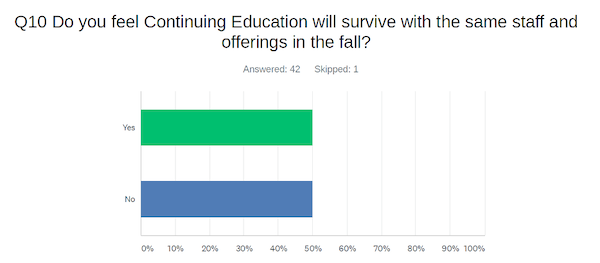
The answer to the next question showed that 46.3% of the leaders expect to hire new staff with new skills in the future.
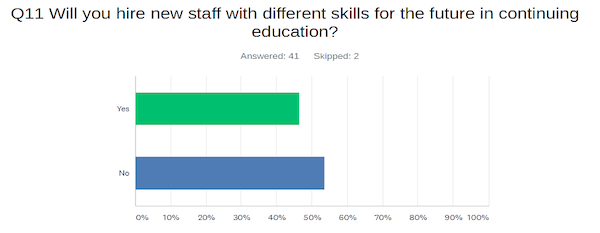
When asked if they have staff to develop online courses today about 54% replied no. During the sessions, respondents shared that they have been working with third party vendors on their online courses–such as World Education LLC for professional courses and Ed2Go for personal enrichment courses. Today, more than ever, leaders will need to develop more skilled staff to be able to provide the training and education employers need of graduates.
While staffing will be difficult for the next year based past experiences, which show hiring freezes and layoffs to solve funding and enrollment challenges, it will be smart to review programs and eliminate those that cannot support themselves or deliver on their missions and stand up against significant competitors. The survey revealed a major difficulty in revenue generation. Over 60% estimate they are losing over 50% to 70% of their revenue from the winter and fall 2020 semesters.
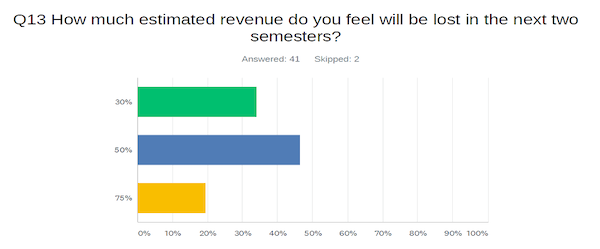
With this lost revenue, it will be nearly impossible for current staff to recover in 2020. The leaders were then asked if more revenue will be gained by moving courses online, but they do not believe that it will make a significant difference in the short term.
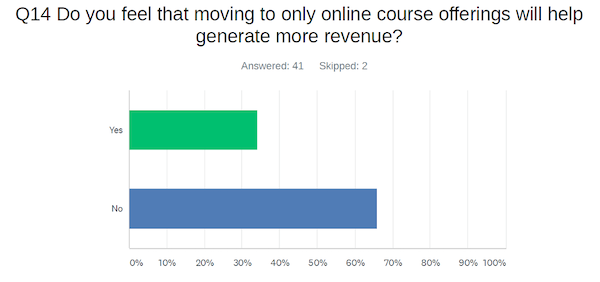
Some of the reasons stated for online courses failing to make up lost revenue are based on the fact that the division normally has a small social media presence or a very small budget for digital marketing. While the leaders stated they employ social media managers, they are not wholly dedicated to that effort, and they are also not using any paid services–just organic posts that have a mild effect on the community.
While we shared concern over staffing issues in the beginning of this report, the final issue is with managing current staff. Over 85% of respondents said they have not managed staff in the virtual environment. As I have led and worked in the virtual world myself for the last eight years, I can confirm that it is a skill and talent to manage the different online tools for courses, staff, instructors and meetings.
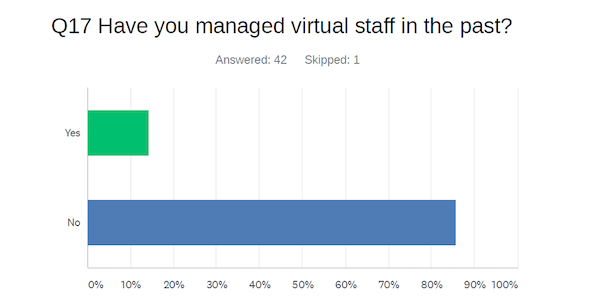
The non-credit departments are going to face their biggest challenges over the next six months because they are understaffed and these teams with little experience with and skill in running online courses. Many CE leaders are in for a difficult time.
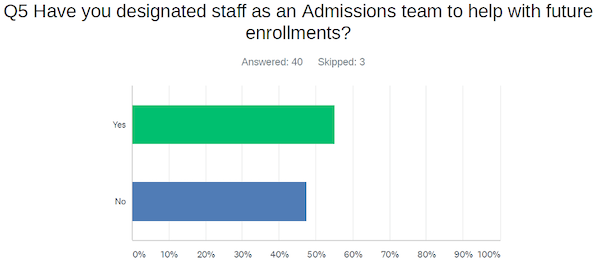
Recommendations for the next six months:
Learn about and provide training on tracing, healthcare screening and temperature-taking. You will need to implement all these practices to protect students, faculty, college and yourself.
Keep running the program review and decide who is going to be part of the team. Consider skill sets and how they will be managed from the office and from home.
Reconsider your adjunct faculty training for online and in-classroom courses.
Seek partnerships to support you during this time—ones that are positive, share a good revenue and offer a communications plan. Ask to see their completer percentage and ask other colleges that you know work with them to confirm that number.
Each leader will need training in virtual leadership to help people work from their virtual offices and to learn how to hold people accountable for outcomes–not just time spent at a desk. Unfortunately, people can drift off to other things, if not managed well. During the first online conference held by the National Council for Continuing Education, I presented about the home office and virtual tools available to us to manage staff. I can provide a copy of that presentation if you email me at thightower@gradcast.com.
Organizations will need to consider their online marketing and digital marketing plans. They will also need to seek funding to advertise online programs.
If you would like a copy of the full report with the survey data, please email me at thightower@gradcast.com.
You will need to provide new services to support your students as the online market becomes more and more competitive.
Buckle up and get ready for the ride of your higher education life—you’ll need it to survive until 2021!



